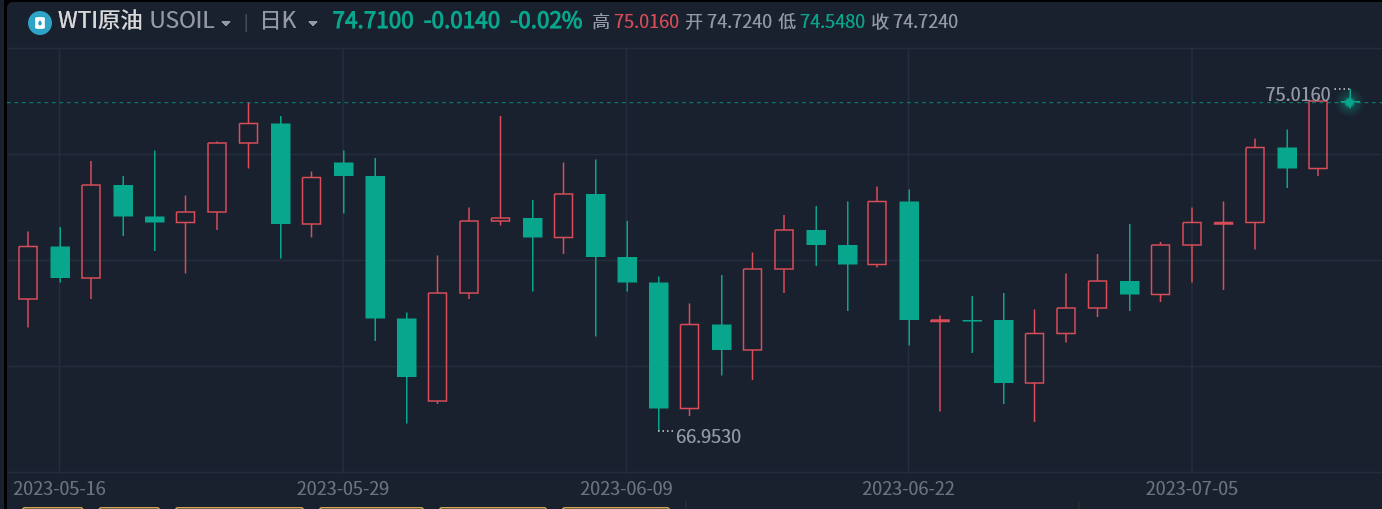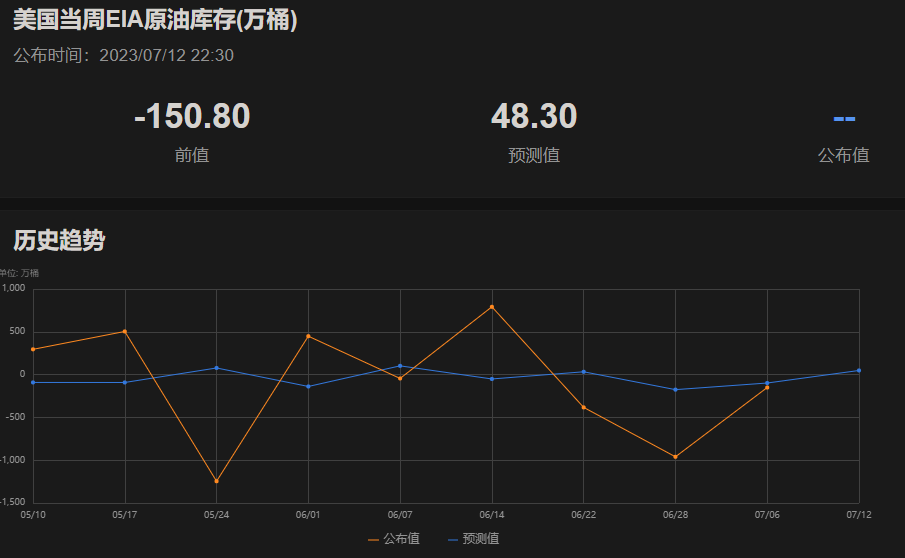EIA raises global crude oil demand growth forecast API inventory data but throws cold water.
U.S. crude oil inventories rose by about 3 million barrels in the week ending July 7, more than expected, which to some extent cast a layer of concern over the oil market。
On July 12, WTI crude oil is currently trading at 74.Near $7,240 / barrel, down 0 on the day.02%。In the last trading day, U.S. oil closed above 2%, a 10-week high, boosted by demand.。

Yesterday, the U.S. Energy Information Administration (EIA) released its latest monthly forecast, the Short-Term Energy Outlook, raising its forecast for global crude oil demand growth in 2023 to 1.76 million barrels per day from the original 1.59 million barrels per day.。Separately, the agency also slightly lowered U.S. crude oil production this year by 50,000 bpd to 12.56 million bpd from its last monthly forecast of 12.61 million bpd, essentially unchanged.。
Earlier, OPEC + had announced that it would extend the production cut agreement until the end of 2024, overlaying the EIA's cut in U.S. crude oil production forecast for this year, boosting oil prices to some extent.。However, the agency has revised up its forecast for U.S. crude oil production next year: according to the agency, production will reach 12.85 million barrels per day next year, up from the previous forecast of 12.77 million barrels per day.。
The EIA also expects OPEC + oil production growth to decline slightly this year, reducing global supplies to 1 per day..01.1 billion barrels, slightly below demand。Next year's global oil production is 1.026.9 billion barrels per day。
On the demand side, the EIA believes that total U.S. oil consumption will increase by 100,000 barrels per day to 20.4 million barrels per day this year and another 400,000 barrels per day to 20.8 million barrels per day in 2024.。In terms of oil prices, the EIA said that the average spot price of Brent crude oil in July was $78 per barrel and that the price of cloth oil is expected to reach $80 per barrel in the fourth quarter of 2023, driven by a reduction in crude oil inventories.。
In terms of energy mix, the EIA also gave possible changes in the U.S. this year and next: the agency said that the U.S. energy mix remained dominated by natural gas for the past two years, accounting for 41 percent and 40 percent this year and next; coal power will fall to 16 percent this year from 20 percent last year and fall further to 15 percent next year; renewable power will rise to 23 percent from 22 percent last year and is expected to rise to 20 percent next year;。
In this report alone, U.S. crude oil production has been slightly reduced this year, while the country's total oil consumption will increase annually this year and next, which will, to some extent, tighten supply and demand in the oil market and boost oil prices.。
For the rise in oil prices, the EIA's statement is: "The main factor driving the rise in global oil prices is the reduction in crude oil inventories," but, according to the American Petroleum Institute (API) released data, U.S. crude oil, gasoline and distillate inventories all increased last week.。Specifically, in the week ending July 7, U.S. crude oil inventories increased by about 3 million barrels; gasoline inventories increased by about 1 million barrels; and distillate inventories increased by about 2.9 million barrels, more than expected, which to some extent cast a layer of concern over the oil market.。
In this regard, analysts said, overall, oil prices benefited from the dollar hit a two-month low, EIA cut this year's U.S. crude oil production forecast, optimistic about demand expectations, and the world's major oil exporters to cut supply, oil prices can act strongly, the day is expected to continue to shock upward, but it should be noted that the morning API data show an increase in inventories, if the evening EIA further shows an increase in inventories, oil prices short-term gains。
On the evening of July 12, Beijing time, EIA will announce EIA crude oil inventories for the week from the United States to July 7.。According to economists, the data is expected to record 48.30,000 barrels, with a previous value of -1.5.80,000 barrels, if the data released this time is higher than the forecast, or cut the U.S. oil action can.。

·Original
Disclaimer: The views in this article are from the original Creator and do not represent the views or position of Hawk Insight. The content of the article is for reference, communication and learning only, and does not constitute investment advice. If it involves copyright issues, please contact us for deletion.